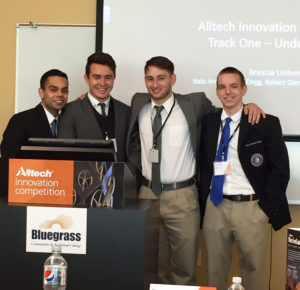The four members of Algave, a company formed by Brescia University students, are pictured here during the Alltech Innovation Competition on April 11 in Lexington, Ky. From left are Italo Arruda, Alex Degg, Bobby Glenn and Will Johnson.
It’s doubtful many people have heard of a product called SAM 1, or the company that envisioned it, Algave. But the product’s roots are intertwined with the Ursuline Sisters of Mount Saint Joseph.
SAM 1 stands for “Saint Angela Merici 1,” said Alex Degg, a business major who graduated May 9 from Brescia University in Owensboro, Ky. Saint Angela founded the Ursuline Sisters in Brescia, Italy, the namesake for the school begun by the Ursuline Sisters of Mount Saint Joseph.
“We wanted to keep it based on the values we have at Brescia,” said Bobby Glenn, a senior business major.
Along with fellow May 9 graduate Italo Arruda and sophomore Will Johnson, the four formed Algave — a combination of “algae” and “save’’ – to compete in the Alltech Innovation Competition on April 11. The Lexington-based company began the competition in 2013 to “challenge the creative minds of undergraduate and graduate students … to prepare forward-thinking business plans on innovative ideas in food and agribusiness that will improve economies, create jobs, elevate efficiencies and foster sustainable practices,” according to the Alltech website. The competition this year was the first time Brescia was offered the chance to compete.
All but Johnson were members of CO.STARTERS, which Brescia began in fall 2014 in partnership with the Greater Owensboro Economic Development Corp., and the Kentucky Innovation Network. It’s a nine-week “business boot camp” focusing on innovation and finding solutions to problems, said Helen Bennett, who recently concluded her tenure as director of Career Services at Brescia.
To compete in the Alltech competition, the students needed a problem to solve involving agriculture. There was just one problem, Bennett said.
“None of us knows anything about agriculture; we don’t even have an agriculture department,” she said. “With an agriculture theme, it only made sense to head to the Mount.” They turned to Mark Blandford, farm manager for the Ursuline Sisters of Mount Saint Joseph.
“Mr. Blandford said fertilizer costs were a problem,” Glenn said. “We were very interested in finding a solution.”
Their idea was to use a process called hydrothermal liquefaction using algae to produce a much cheaper source of fertilizer for farmers.
“You put algae and other biomaterial in an extreme pressure cooker and it produces crude oil and fertilizer,” Johnson said. “Our idea was to scale it to a small farm. We’ve not found anyone doing it.”
“Most people focus on the crude oil,” Glenn said. Bennett selected the three seniors who had worked together before, and they recruited Johnson, a biology major, to explain the science.
Johnson met with Ernie Hiatt at Kentucky Bioprocessing, an Owensboro company that extracts and purifies proteins from plants. The company made headlines in 2014 for helping produce an experimental serum to fight Ebola.
“We pitched him the idea,” Johnson said. “He told us he thought it was a very feasible idea. That was helpful.”
The upfront costs of the process made Blandford hesitant, Bennett said.
“He was really budget-conscious as a small farmer,” Glenn said. “We believe you can get your return on the investment in less than two years. It’s a $110,000 investment for the hydrothermal liquefaction and a distillation tower that separates the fuel,” he said.
“We expect it would produce 140 tons of nitrogen-rich fertilizer a year,” Arruda said. “The Mount farm used 117 tons in the last year at a cost of $70,000.” Within two years that $110,000 investment would be recouped in fertilizer savings, he said. The distillation tower could turn the crude oil into enough diesel or gasoline to power itself to keep the costs low, or the crude oil could be sold, Glenn said.
The students’ pitch for investors in their presentation paraphrased one of Saint Angela Merici’s most well-known sayings, “Read the signs of the times and adjust.”
The Brescia students did not get started on the project until January and delays caused by bad weather put them at a disadvantage with the competitors at Alltech, most of who came from schools with agriculture departments, Bennett said. Brescia did not win, but picked up valuable experience and contacts with companies such as Alltech and Proctor & Gamble, Arruda said.
“The executive director of the National Algae Association in Texas contacted us,” Johnson said.
“The judge from Proctor & Gamble thought it was a brilliant idea,” Bennett said. “The biggest question we got was whether it was feasible,” Glenn said.
The students agreed that not having a completed product to show farmers made them more skeptical of the idea. The group that won the graduate level competition had a completed product, Glenn said.
“Farmers have to see the value in it quickly, or they lose interest,” Glenn said. “We thought a group of farmers could go in together on the investment,” Degg said.
There are environmental benefits to using the process the students suggest, Johnson said.
Many farmers use anaerobic respiration ponds to collect their animal waste, with the decomposition creating methane, Johnson said. The result is spread on crops as fertilizer, but it’s inefficient and smells bad, he said.
“Adding algae to the pond would actually clean the pond and create fertilizer,” Johnson said. “In all bodies of water, some form of algae exists. We would have to test for different strains of algae to see which worked best.”
The students have a few options to consider for their next step.
“It’s something we need to sit down and decide whether we want to seek other competitions at the graduate level, or look for an investor,” Arruda said.
